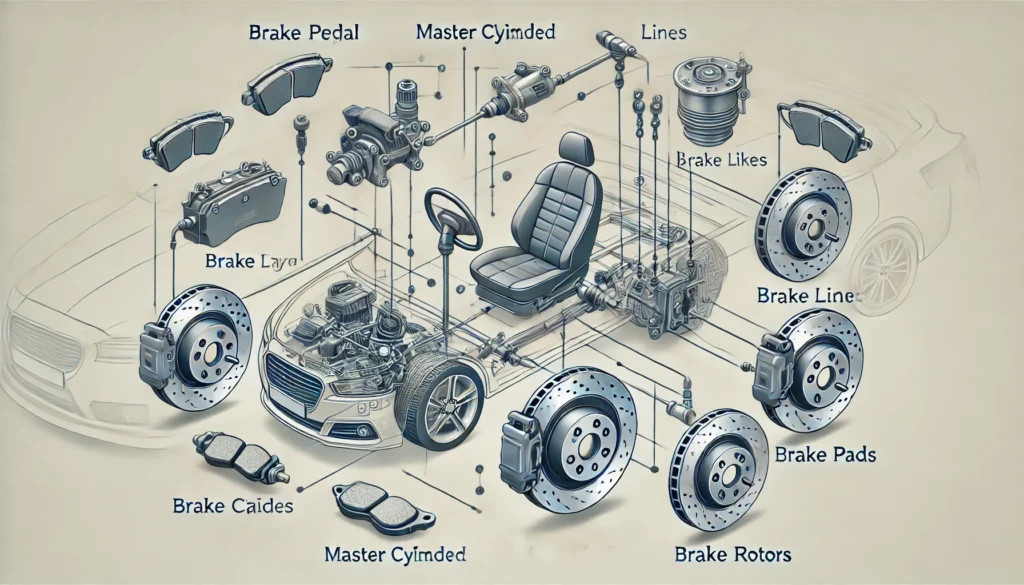The brake system is a critical component of any vehicle, ensuring safe and effective stopping power. When a brake system fault occurs, indicated by the brake warning light on the dashboard, it raises concerns about vehicle safety and performance. One common question is whether a brake system fault can affect engine oil. Understanding the relationship between brake system faults and engine oil is essential for effective vehicle maintenance and troubleshooting.
Understanding the Brake System
The brake system comprises several key components, including the brake pedal, master cylinder, brake lines, calipers, brake pads, and rotors. These parts work together to create the friction necessary to slow down and stop the vehicle effectively.

Understanding Engine Oil and Its Function
Engine oil plays a crucial role in lubricating engine components, reducing friction, cooling the engine, and preventing wear and tear. Regular maintenance of engine oil is vital for the longevity and efficiency of the engine.

Impact of Brake System Fault on Engine Oil
- No Direct Impact:
- Explanation: The brake system and engine oil operate independently. The brake system is specifically designed to manage braking performance, while engine oil is concerned with engine lubrication and cooling.
- Scenario: A brake system fault does not directly affect the condition, level, or performance of engine oil.
- Indirect Impact Through Driving Behavior:
- Explanation: While a brake system fault does not directly impact engine oil, it can indirectly influence driving behavior, which could potentially affect engine performance and oil usage.
- Scenario: If a driver becomes more cautious or experiences more frequent hard braking due to brake issues, it might slightly alter driving conditions but still not significantly impact engine oil.
- Associated Electrical Issues:
- Explanation: In rare cases, electrical issues causing brake faults might also affect other systems, but this is uncommon and typically would not influence engine oil.
- Scenario: Major electrical faults might affect multiple vehicle systems, but this would be a broad issue impacting overall vehicle performance, not specifically the engine oil.
Maintaining Brake System and Engine Oil
- Regular Brake System Maintenance:
- Steps: Regularly inspect the brake components, including pads, rotors, calipers, and brake lines. Address any warning lights promptly using an OBD-II scanner to diagnose and fix issues.
- Importance: Ensuring the brake system functions correctly enhances vehicle safety and performance.
- Regular Engine Oil Maintenance:
- Steps: Check the engine oil level regularly using the dipstick. Change the engine oil and filter as recommended by the vehicle manufacturer, typically every 3,000 to 5,000 miles.
- Importance: Maintaining proper engine oil levels and quality is crucial for engine health and efficiency.

Diagnosing Brake System and Engine Issues
- Use an OBD-II Scanner:
- Steps: Connect the scanner to the vehicle’s OBD-II port to read error codes related to the brake system. These codes help identify specific problems.
- Importance: Accurate diagnosis is key to addressing brake system faults effectively.
- Inspect Engine Components:
- Steps: Regularly inspect engine components, including checking oil levels and looking for leaks or other signs of wear.
- Importance: Preventive maintenance ensures the engine operates smoothly and reduces the risk of serious issues.
- Consult a Professional Mechanic:
- Steps: If you are unable to diagnose or repair issues yourself, seek assistance from a certified mechanic. They have the expertise and tools to address complex problems.
- Importance: Professional diagnosis and repair ensure that the vehicle is safe and reliable.
Conclusion
A brake system fault does not directly affect engine oil. The brake and engine oil systems operate independently, with the brake system focused on braking performance and engine oil concerned with lubrication and cooling. Regular maintenance of both systems is crucial for vehicle safety and performance. Addressing brake system faults promptly and maintaining proper engine oil levels will ensure that your vehicle operates efficiently and safely.